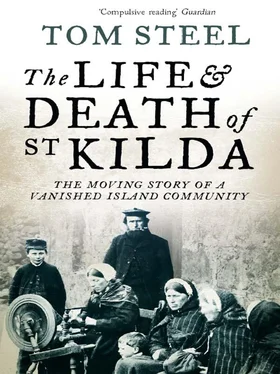Now, over fifty years after the evacuation, the whole story can be told, and in particular what happened to the St Kildans after they decided to abandon Hirta and settle on the mainland of Scotland. It was not until 1968 that the records of the Scottish Office pertaining to the 1930s were made available to public examination. In the Public Records Office in Edinburgh lie more than two dozen files that once were the property of the Department of Agriculture. From the collection of letters, minutes, and memoranda can be gleaned the true tragedy of the evacuation – not only the human distress involved, but the parsimony and bureaucratic behaviour of the civil servants concerned in the event – behaviour which makes one question whether they can ever be capable of true compassion.
The evacuation of St Kilda was to illustrate the basic insecurity of the society that had developed on the mainland of Scotland. It was an insecurity that showed itself when faced with a seemingly small and insignificant community such as was found on Hirta. It was thought that if the St Kildans could not adapt and accept the values of the dominant society, the only solution was to bring about a state of affairs which would result in evacuation. In this sense, the British government’s obsession with the costs involved in providing the St Kildans with a nurse and a postal service mirrored the feelings of a society that not only demanded money should not be wasted in such a way but, more importantly, would not accept that anomalies may, let alone should, exist.
Throughout most of the last century, St Kilda was subject to pressures. Education, organized religion and tourism all attempted to throw into doubt the St Kildans’ way of life. For centuries the world outside stood aloof from the people of Hirta. They were content on the mainland to allow such a remote community to go its own way. As long as the people of St Kilda were so isolated, they were insulated from the forces that wished them to conform. The strength of the community, however, became weakened as contact with the mainland increased. When disease decimated their number and wind and sea made the acquisition of adequate supplies of food difficult, the St Kildans were forced to turn eastward for help.
The majority of books written about St Kilda appeared during the nineteenth and early twentieth centuries. The authors for the most part were products of the buoyant and vital society of Victorian and later Edwardian Britain – a society in which it was generally thought that man could do little without doing good. The writers felt it was their duty to help others less advanced (and therefore less fortunate) to attain the civilized level of their own society. Help, as interpreted by the articulate spokesmen of a richer and more advanced society, was best given by persuading the islanders to give up the struggle.
In 1930 the people of Hirta unwittingly threw themselves into the twentieth century. As adults, they had to accept those values that most of us on the mainland are taught to believe in from birth. For instance, the islanders found it difficult to base their existence upon money. They had never lived in a world in which they bought goods and services of each other. They had of course accepted gladly the opportunity of making a little money for themselves at the expense of tourists, but that intrusion had never altered the basic relationship one St Kildan had had with another.
The islanders showed themselves indifferent to the jobs they were given on the mainland. The labours asked of them were menial contrasted with the spectacular feats they had once performed in order to kill sea birds. Moreover, the slaughter of fulmars and gannets directly determined whether the community on Hirta had enough food to survive. When they worked on the mainland, the St Kildans realized that the tasks they performed did not supply them immediately with what was needed to keep them fed and warm. On the mainland, the islanders worked for money. Money was necessary in order to purchase from others the things necessary to life. Between the employment of their skills and survival came a state of affairs that we all take for granted.
The history of the St Kildans after the evacuation, of their inability and lack of resolution to fit into our urban society, makes sad reading. If St Kilda had been an isolated home, the islanders were to discover that the remote district of Argyll in which most were settled was even more alien. On Hirta at least they had formed a tightly-knit community with a common purpose. When they were resettled on the mainland, the St Kildans were forced to live in homes miles apart from each other, in a society whose values were unacceptable if not incomprehensible to the majority of them.
The history of the St Kildans shows the folly of thinking of the islanders as similar to ourselves, and their community but a distant cousin of our vast urbanized society. The death of St Kilda was to prove the most important in the history of island depopulation in Scotland. The publicity the evacuation received brought home to government and public alike the hazards involved in seeking to solve the problems of isolated communities by simply evacuating them.
When, in 1936, a government committee examined the economic conditions of the Highlands and Islands, the members concluded ‘that in view of the present trend towards concentration of population in the larger cities and industrial centres, the full development of an area such as the Highlands for the building up of a strong, healthy, virile race must be regarded as being of vital importance to the nation, and for this reason, if no other, we feel justified in making recommendations involving expenditure’. During the last world war, in fact, the county of Inverness provided more soldiers than any other county in Britain. It was not unemployment alone that forced men into service: the battle honours of both world wars read like the roll-call of the Battle of Culloden.
To this day, however, a large and often influential section of our society demands that communities which cannot support themselves should be similarly dealt with. The history of mankind, it seems, must of necessity be a continual process of the inhabitation and evacuation of areas that for a time suffice man’s needs. In terms of Britain, the Highlands and Islands of Scotland have been sacrificed in order to advance civilization.
The story of the life and death of St Kilda is perhaps more pertinent today than it has ever been. Our industrial society has forced people to contract relationships with each other on the basis of money. Money is what binds individuals together and fixes the relationships they have with each other. Opulence in the modern Western world has become the yardstick of human happiness and it has been widely accepted that men should always strive in search of economic wealth unless ignorance, poverty, or sheer habit prevent them from doing so.
We are presently faced with the pressures and problems that the money motive has helped create. The poverty of urban industrialized life and the human stress that is now showing itself in practically every Western industrialized society call into question the basis upon which our society is founded. More recently, the energy crisis, problems of pollution and monetarism have altered the rate at and method by which society seeks to advance itself. Given our present crises, however temporary they may prove to be, it is natural that we doubt the goal of our endeavours. The story of St Kilda may be a small human tragedy, but the study of the islanders’ former ways and the reasons why the people were forced to evacuate their island might provoke some to question our future.
Wednesday 27 August 1930 was overcast for most of the day on St Kilda. Shortly after dawn a raw mist slowly rolled over the Atlantic from the nearby island of Boreray and spilled over the cliffs on Conachair like a waterfall. By the afternoon a thick, grey blanket hung low over the village. It was cold and damp – so unlike the summer days of the previous week. Few on the island, however, had time to notice that the weather had changed. The St Kildans had much to do if in two days’ time they were to leave the island forever.
Читать дальше












